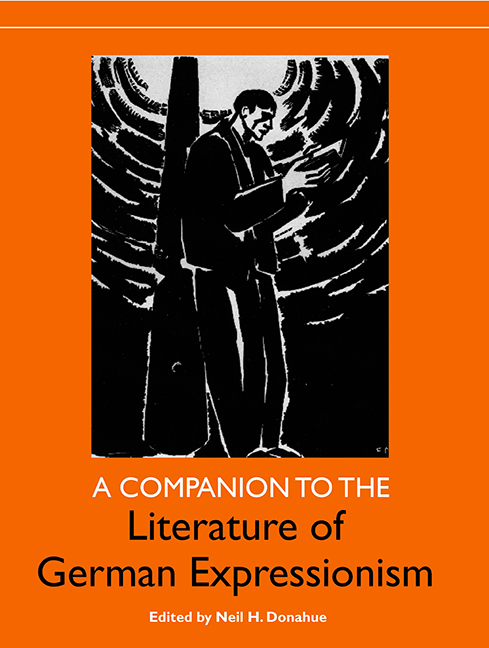Book contents
- Frontmatter
- Contents
- List of Illustrations
- Preface and Acknowledgments
- Chronology
- Introduction
- Philosophical Background
- Prose
- Poetry
- Drama
- Interdisciplinary
- 10 Intimate Strangers: Women in German Expressionism
- 11 Expressionism and Cinema: Reflections on a Phantasmagoria of Film History
- Select Bibliography
- Notes on the Contributors
- Index
10 - Intimate Strangers: Women in German Expressionism
from Interdisciplinary
Published online by Cambridge University Press: 28 April 2017
- Frontmatter
- Contents
- List of Illustrations
- Preface and Acknowledgments
- Chronology
- Introduction
- Philosophical Background
- Prose
- Poetry
- Drama
- Interdisciplinary
- 10 Intimate Strangers: Women in German Expressionism
- 11 Expressionism and Cinema: Reflections on a Phantasmagoria of Film History
- Select Bibliography
- Notes on the Contributors
- Index
Summary
Women in German Expressionism have been the intimate strangers of the movement in more senses than one. As literary artists and participants in that avant-garde explosion of creativity and innovation at the beginning of the twentieth century, they remained largely unacknowledged by male leaders of the movement, their works and perspectives for the most part invisible, both to the movement and to the wider public. Later, when literary critics and academics rediscovered Expressionism in the 1950s and 1960s, following decades of eclipse and then violent suppression, it was male exponents of the movement who were reprinted, providing the foundation for scholarly work and the canonical examples of Expressionist literature that have since shaped our definitions and understandings of the movement. The manifestos and other documents of Expressionism selected for reprinting have compounded the problem. Even feminist literary scholarship, which began to thrive in the 1970s and 1980s, has mostly overlooked the women of German Expressionism.
The topic of women and Expressionism has several separate but related facets. Traditionally in feminist research on women in literature, there has been first the question of how women are portrayed. The emphasis in such analysis is primarily but not exclusively on the canonical male authors of a movement and their treatment of women characters or women's issues. Second, there is “recovery”: the task of discovering the works of women authors, researching their biographies and reconstructing their bibliographies. In particular, the scholarship of recovery focuses on determining the extent to which women authors participated in or influenced the literary movements they are associated with, and identifying the ways in which their writings resemble or differ from those of male authors, whose works in reality set the standards. Finally, on the conceptual or theoretical level, the key question becomes: What do comparisons of the writings of male and female authors tell us about a particular literary movement, and how does the inclusion of works by women force us to significantly redefine, for example, such concepts as period, style, genre, aesthetic intent, characteristic themes and issues, or even “greatness”?
The bulk of scholarly work on women in Expressionism has confined itself to the first category, that is, the portrayal of female figures in Expressionist works largely by men.
- Type
- Chapter
- Information
- A Companion to the Literature of German Expressionism , pp. 287 - 320Publisher: Boydell & BrewerPrint publication year: 2005



